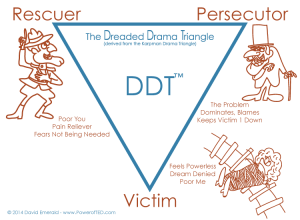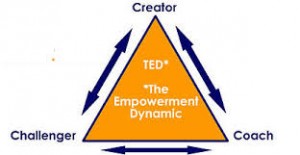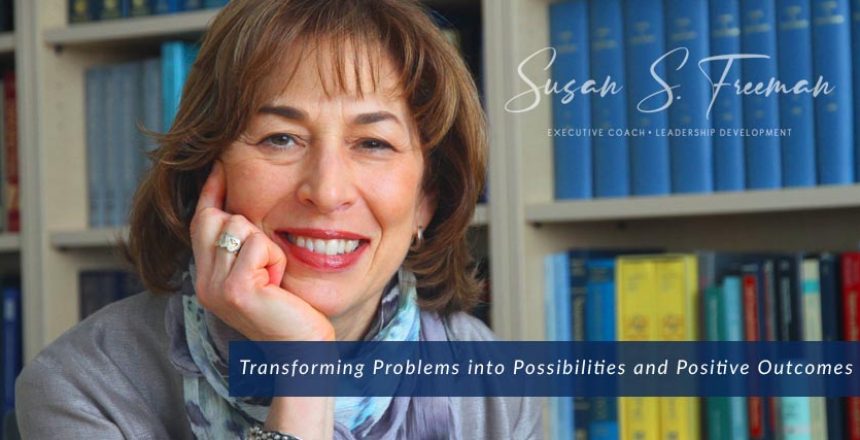Reposted from my Conscious Shift Magazine article.
One famous adage leaders often quote is that of President Harry S. Truman, who said, “the buck stops here.” But what happens in organizational (and family) life often resembles more of an old-style Hollywood movie than a model of responsible leadership. If we peek behind the screen, we often find the dreaded drama triangle, complete with Persecutor, Victim, and Rescuer.
 According to Leadership Coach and Author Gary Cohen, “the health and efficiency of an organization can be judged by how often triangulation occurs and whether or not it is tolerated by leaders. Triangulation is when two parties don’t speak directly to each other. They mediate their concerns through a third party. As a result, triangulation usually produces gossip, rumors, inefficient practices, and persecutory attitudes. It’s a culture killer.”
According to Leadership Coach and Author Gary Cohen, “the health and efficiency of an organization can be judged by how often triangulation occurs and whether or not it is tolerated by leaders. Triangulation is when two parties don’t speak directly to each other. They mediate their concerns through a third party. As a result, triangulation usually produces gossip, rumors, inefficient practices, and persecutory attitudes. It’s a culture killer.”
He states: “According to Stephen Karpman, who coined the term Drama Triangle, these three roles typically emerge in triangulation:
- Victim–Victims blame and fault others (or situations), but not themselves; they don’t typically take responsibility for their own lives. They show up as angry or pathetic, in response to perceived injustice. They send out a radio-like signal saying help me, rescue me, need me, be with me, love me, or organize me to all rescuers within range. They may exaggerate the level of harm to gain pity or sympathy from a rescuer. According to Karpman, the victim’s guilt or blame is the fuel that keeps the Drama-Triangle cycle spinning like a flywheel.
- Persecutor–In order for there to be a victim, there must be a persecutor. The persecutor can be a person, circumstance, event, or thing. Persecutors become the target of the victims’ need to blame something outside themselves for their problems.
- Rescuer–The rescuer is the hero of the story. Rescuers see it as their role to help the helpless. They don’t view victims as capable, so they act in their stead, often without realizing the full consequences of intervening. Sometimes they rush to protect others’ vulnerabilities because they’re reluctant to face their own.”
Own your role in the drama.
Fortunately, there is a way out. Leaders must learn to exit the triangle. First they need to become aware of the role they may be inadvertently playing or be drawn towards playing. The awareness can then be converted into a shift from drama to empowerment. Now the dynamic changes completely. This has been described by Donna Zajonc and David Emerald as “The Empowerment Dynamic” or TED.
In TED, the new roles are Creator (formerly Victim), Challenger, and Coach. The Creator focuses on the desired outcome rather than hiding from persecution. The role of the persecutor fades away, and is replaced by the Challenger. “To make that shift”, Emerald states, “you need to own your role in the drama and shift from a fault-oriented mindset (victim) to an outcome-oriented mindset (Creator). The challenger can inspire learning and growth, either consciously helping the creator realize their potential, or unconsciously by challenging the creator to confront a situation instead of avoiding. The third role in this dynamic is the role of coach. Rather than depending on the victim to ‘need’ them, the coach instead works with the creator to develop their outcome vision and creates concrete steps toward realizing the goal.”
 Emerald suggests the following questions to get started:
Emerald suggests the following questions to get started:
- What role are you playing in the drama?
- What do you want?
- What is your intention toward others involved in the drama?
- What is the caring behind the complaint?
Leaders are responsible for helping shift from a problem-focus, with accompanying anxiety, fear and drama into an outcomes-focus. This is a climate where there is passion and care for creative solutions.
Ask yourself: “what part of the triangle am I responsible for maintaining” and “what would it take for me to get out of it?”
Responsible leadership begins here. Change what doesn’t work into something that does work.

